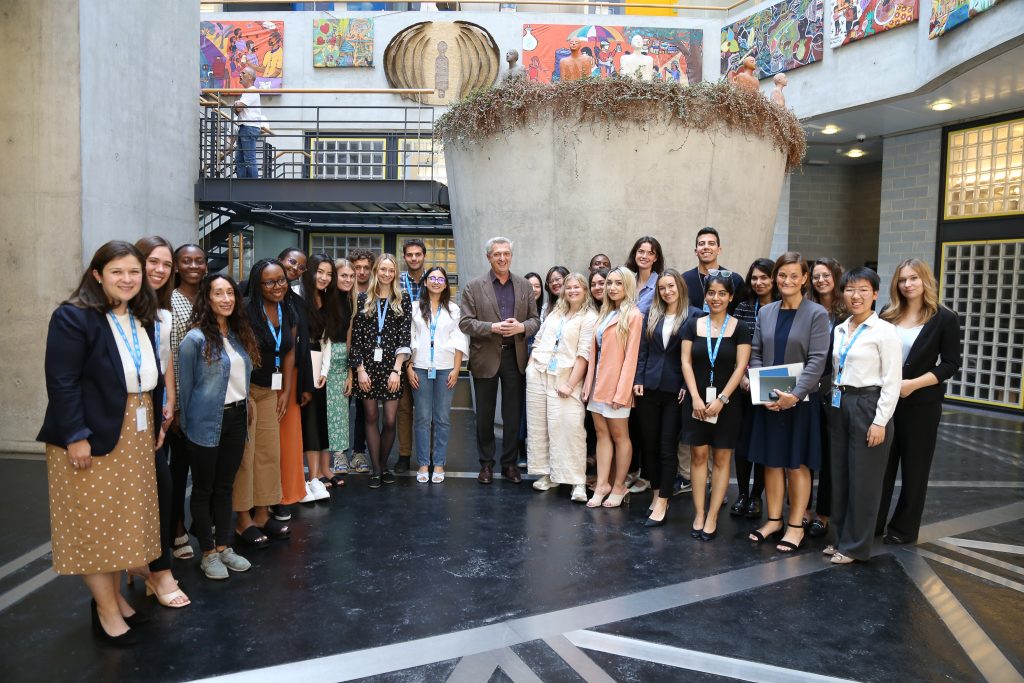Continuing our series of Alumni Interviews, we had Alfred Kareh answering our questions about his career path after graduating at MICSEA.
What have you been working on since you’ve graduated from the program?
Immediately after graduating, I was privileged to secure an internship at the United Nations High Commissioner for Refugees (UNHCR) headquarters in Geneva. This enriching experience spanned a period of eight months, including a two-month extension beyond the initial six-month internship duration. During my internship, I was assisting in the Cash Based Intervention (CBI) Unit. This invaluable opportunity allowed me to deepen my understanding of UNHCR’s interventions deployed worldwide. I actively engaged with diverse stakeholders, gaining deeper knowledge in the humanitarian system. The experience was rewarding as it facilitated the expansion of my professional network while improving my skills in various facets of humanitarian work. Subsequently, I pursued employment opportunities, particularly within United Nations agencies and I got a recent appointment as an Associate Cash Based Intervention (CBI) Officer in the cross-border operation between Turkey and Syria. In this role, I will be supporting the implementation of a pilot CBI project in the A’zaz region in Syria.
Is the work field in any way different from what you expected when you first graduated from the masters?
I realized that the reality of the work field has presented both expected elements and unexpected differences compared to my expectations when I first graduated.
During my studies, I had the opportunity to explore various topics that piqued my interest. Courses offered by UN-related and humanitarian professionals provided valuable insights into international organizations and their role in humanitarian action. Other diverse courses further expanded my knowledge and understanding of sustainable architecture, emergency response, and community-driven approaches. Furthermore, my master’s thesis, which focused on Cash Based Intervention equipped me with a comprehensive understanding of the principles and practicalities of implementing CBI programs. This knowledge has proven invaluable in my pursuit of a career in the humanitarian field.
In addition to that, the international cooperation aspect was present in both the master’s program and the work field. Throughout my studies, I engaged with a diverse cohort of students and professors, which provided a rich multicultural learning environment. Similarly, in the working field, I encountered a global network of professionals and collaborated with individuals from different backgrounds, cultures, and organizations. This international environment not only enhances the exchange of ideas and best practices but also fosters a broader understanding of global challenges and the importance of collaborative efforts in addressing them.
However, there were certain differences between my expectations and the reality of the work field. I underestimated the ease of finding opportunities after completing my master’s, particularly considering the network I had built during my studies and the valuable internship experience I gained. The competitive nature of the field and the specific requirements of organizations made it more difficult than I initially anticipated. While the path may be challenging, the combination of knowledge and skills taught during the MICSEA can ultimately lead to an impactful career in the humanitarian field.
What advice would you give to our current students in the masters program about their next steps?
– Embrace experiential learning opportunities: Seek internships, volunteer work, or research projects within the humanitarian field. These experiences provide invaluable practical insights, allowing you to apply theoretical knowledge and develop essential skills. Engaging in hands-on work enhances your understanding of the field and helps you discover your passion and niche.
– Network and build relationships: Actively connect with professionals, alumni, and organizations within your sector of interest. Attend conferences, workshops, and networking events to expand your network and learn from seasoned experts. Building relationships opens doors to new opportunities, mentorship, and potential collaborations.
– Stay updated and adaptable: The humanitarian field is constantly evolving. Stay informed about current trends, emerging technologies, and best practices through academic literature, industry publications, and relevant online platforms.
– Develop diverse skills: In addition to specialized knowledge in your field of interest, cultivate a broad range of transferable skills. Effective communication, project management, data analysis, and intercultural competency are highly valuable in the humanitarian sector. Strive for a well-rounded skill set that enables you to contribute effectively in various capacities.
– Remain committed to your ethics: Never lose sight of the core values and principles you learned and believe in. Demonstrate empathy, integrity, and a genuine commitment to making a positive impact on the lives of those in need. Upholding ethical standards and promoting inclusivity and diversity should be at the forefront of your endeavors.
Once you graduated from the MICSEA what made you decide on the field of work you are in?
After completing my Masters of International Cooperation in Sustainable and Emergency Architecture, I found myself at a pivotal point in my career. As a civil engineer, I have a background in the technical aspects of my field, but I also have a deep-rooted passion for the humanitarian system. The desire to combine these made me pursue further specialization in the humanitarian field.
During my time in the master’s program, I could explore various facets of humanitarian work, broadening my understanding of the challenges and complexities involved. Especially while developing my thesis research on Cash Based Interventions (CBI) I developed a profound connection and affinity towards this specific area. The more I went deeper into the subject matter, the more my interest for CBI grew.
The idea to embark on a career path in the field of CBI and humanitarian work became evident to me. I realized that by working in this field, I could not only utilize my skills and knowledge but also contribute to provide a more efficient means of assistance for communities affected by emergencies and crises.
Additionally, the opportunity to intern with UNHCR in their global CBI team further solidified my commitment to this field. Being able to work alongside experienced professionals and gain hands-on experience in CBI reinforced my passion and provided a deeper understanding of the immense impact this approach can achieve.


